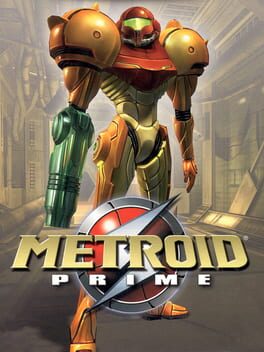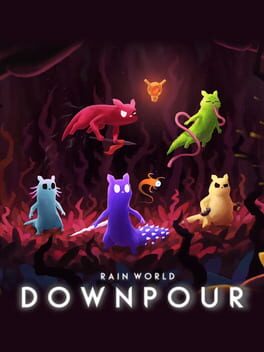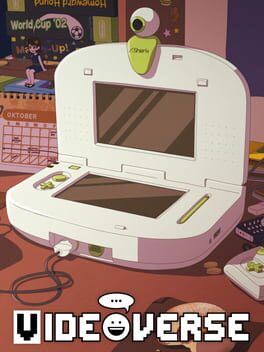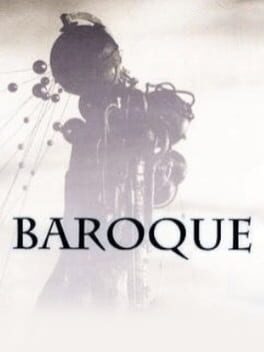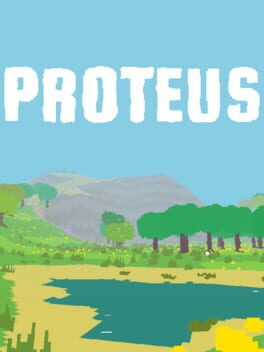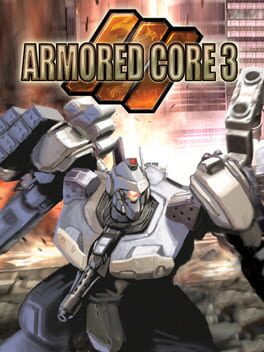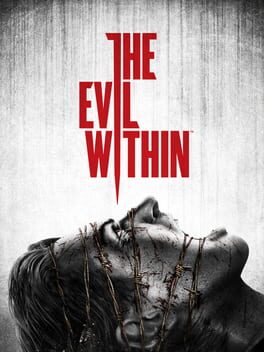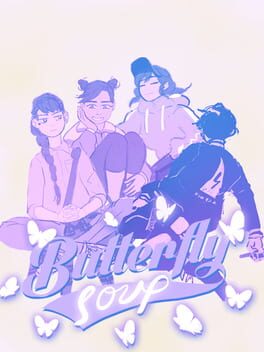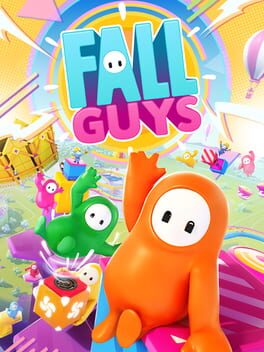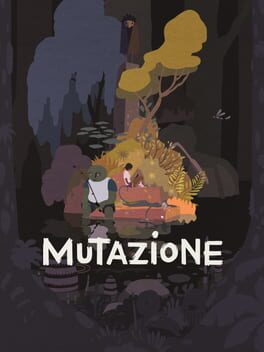45 Reviews liked by Beet
Metroid Prime
2002
Una de las cosas que no esperaba de Metroid Prime es que fuera un zelda. Los jefes son de zelda, cada nivel está planteado como mazmorra de zelda y hasta suena la tonada de zelda cada vez que resuelves un puzzle. Pero también es super metroid, así que prepárate para dar vueltas, muchas vueltas, y ahí tienes tus puertas cerradas para más adelante y el tramo final de recolección de 12 artefactos. El tedio de la filosofía Nintendo se prolonga toda la aventura, sala por sala. Llegas a una puerta sin energía, busca tres interruptores con la visión térmica para abrirla. Entras a la siguiente sala, la puerta está sin energía, busca tres interruptores con la visión térmica para abrirla. Consigues una mejora para el blaster, una señal te indica que debes ir a la zona contraria del mapa.
La mazmorra no funciona como lugar creíble pues la verosimilitud se pierde entre artificales secciones de plataformas y rompecabezas. No funciona como espacio a resolver ya que la exploración no es el reto en ningún momento. No funciona como escenario para una acción de repetitivos encuentros con la profundidad de un charco. Y yo me pregunto, ¿en qué funciona Metroid Prime?
Lo que tiene de propio suena mejor en la teoría que en la práctica. La primera persona, que nos pone en la piel de la cazarrecompensas, con su interfaz orgánica, tiene su gracia y da personalidad a un avatar que de otra forma quedaría desdibujado. Aparte, intenta sacarle algo de partido al punto de vista con los distintos visores, aunque acaben teniendo un uso anecdótico. El escáner, la excusa narrativa para conocer la fauna y flora local, termina siendo una herramienta de ayuda al avance y una guía de puntos débiles de jefes y enemigos antes que un instrumento para el aprendizaje y descubrimiento del ecosistema. Poco interés naturalista muestra el juego cuando los únicos seres que podemos escanear son los que tienen repercusión directa en el juego y nada nos dirá de un banco de peces, insectos fluorescentes o las aves del cielo.
Me da hasta pena Samus, pues con todo su traje de terminator y habilidades extraordinarias no deja de tener la misma voluntad individual que el escarabajo que se te lanza al ataque en el mismo pasillo de siempre. En este escenario artificial con apariencia de mundo, ocupa su lugar como eslabón que mueve el engranaje que es el videojuego, pero nunca como exploradora, cazadora o aventurera.
La mazmorra no funciona como lugar creíble pues la verosimilitud se pierde entre artificales secciones de plataformas y rompecabezas. No funciona como espacio a resolver ya que la exploración no es el reto en ningún momento. No funciona como escenario para una acción de repetitivos encuentros con la profundidad de un charco. Y yo me pregunto, ¿en qué funciona Metroid Prime?
Lo que tiene de propio suena mejor en la teoría que en la práctica. La primera persona, que nos pone en la piel de la cazarrecompensas, con su interfaz orgánica, tiene su gracia y da personalidad a un avatar que de otra forma quedaría desdibujado. Aparte, intenta sacarle algo de partido al punto de vista con los distintos visores, aunque acaben teniendo un uso anecdótico. El escáner, la excusa narrativa para conocer la fauna y flora local, termina siendo una herramienta de ayuda al avance y una guía de puntos débiles de jefes y enemigos antes que un instrumento para el aprendizaje y descubrimiento del ecosistema. Poco interés naturalista muestra el juego cuando los únicos seres que podemos escanear son los que tienen repercusión directa en el juego y nada nos dirá de un banco de peces, insectos fluorescentes o las aves del cielo.
Me da hasta pena Samus, pues con todo su traje de terminator y habilidades extraordinarias no deja de tener la misma voluntad individual que el escarabajo que se te lanza al ataque en el mismo pasillo de siempre. En este escenario artificial con apariencia de mundo, ocupa su lugar como eslabón que mueve el engranaje que es el videojuego, pero nunca como exploradora, cazadora o aventurera.
Rain World: Downpour
2023
Some things you can never forgive, and such charity will never be given to the taste makers that absolutely failed Rain World at release, so called professionals of the medium who were unable to engage with its singular vision and holistic design, to put it mildly. Time however has vindicated Rain World, now a work of cult following and ever increasing recognition and prestige within the most fervent supporters of emergent gameplay, transcending its pilgrims through one of the most affecting and affirming experiences of uncompromised talent and understanding of what videogames can and should be.
6 years later, Rain World's simulation of nature's beautiful cruelty remains an untouchable feat of game design that threads its hidden mechanics and systems with the erratic and unpredictable ecosystem of alien yet animalistic critters that instigate the player to subconsciously participate on a food chain of cause and effect, so seamlessly permeated through Slugcat's learning process of overcoming the odds and discovering where their limits lies.
Downpour represents purely an assertion of the undeniable qualities of the base game, filling it with abundant content that dares not touch the core tenets of Rain World but instead just adding on top new toys and rules with which to navigate its sandbox. Be it Gourmand and its insatiable gluttony or Artificer and its pyrotechnic killing spree, the careful balance of Rain World is never tarnished or dilluted in favor of an experience that runs contrary to the cat and mouse art it excels at.
I will save the remaining Slugcats for a later time. Rain World is a once in a lifetime deal that I wish to forget for a while until the day I once again need to be reminded of its beautifully realized environment of industrial decay and out of control flora and fauna that puts to shame much of Metroid's milestones and whose crushing Rain instils in me a humble reverance for its deafening cleansing brutality, listening to it from the safety of a newly found shelter in the nick of time in the same manner I would listen to the rain outside my room from the comfort of my cozy bed.
6 years later, Rain World's simulation of nature's beautiful cruelty remains an untouchable feat of game design that threads its hidden mechanics and systems with the erratic and unpredictable ecosystem of alien yet animalistic critters that instigate the player to subconsciously participate on a food chain of cause and effect, so seamlessly permeated through Slugcat's learning process of overcoming the odds and discovering where their limits lies.
Downpour represents purely an assertion of the undeniable qualities of the base game, filling it with abundant content that dares not touch the core tenets of Rain World but instead just adding on top new toys and rules with which to navigate its sandbox. Be it Gourmand and its insatiable gluttony or Artificer and its pyrotechnic killing spree, the careful balance of Rain World is never tarnished or dilluted in favor of an experience that runs contrary to the cat and mouse art it excels at.
I will save the remaining Slugcats for a later time. Rain World is a once in a lifetime deal that I wish to forget for a while until the day I once again need to be reminded of its beautifully realized environment of industrial decay and out of control flora and fauna that puts to shame much of Metroid's milestones and whose crushing Rain instils in me a humble reverance for its deafening cleansing brutality, listening to it from the safety of a newly found shelter in the nick of time in the same manner I would listen to the rain outside my room from the comfort of my cozy bed.
Rain World
2017
Completamente comprometido a su idea de mundo, Rain World renuncia a cualquier tipo de progresión que incite al jugador a volver. No hay mazmorras, no hay bosses, no hay un sistema de niveles ni de construcción ni de mejora de equipamiento. No hay siquiera personajes o una historia. Sólo unas imágenes al principio que señalan al escape de este mundo como puntapié.
Por esto resulta normal leer cosas como "recién al tercer/cuarto intento con este juego pude terminarlo" o "lo dejé al poco tiempo" o "lo retomé por recomendación de tal o cual persona". Esta fue mi experiencia, efectivamente. No fueron pocas las veces que, tras una sesión de juego, terminaba en una situación peor a la que había empezado. No sólo por su sistema de "símbolos", que castiga al jugador por morir repetidamente, sino porque cada vez entendía menos cómo progresar en ese lugar y cuál era verdaderamente mi objetivo. No hay nada a lo que agarrarse, sencillamente. Sólo a la sensación de vida que desprende en el momento a momento.
Esa sensación de vida es todo en Rain World. Como tantos otros juegos que logran este efecto, contrapone constantemente un mundo muerto con criaturas vivas en él. La idea permanentemente presente del "lo que alguna vez fue" con el "cómo sacarle provecho ahora?". Sobrevivir en un mundo que no da las condiciones para la vida.
Y las criaturas presentes no están quietas esperando a que el jugador pase cerca para activarse o moviéndose en un patrón repetido. En cada ciclo muestran un comportamiento creíble. Inteligente pero errático, redefiniendo a cada instante sus objetivos pero chocándose por inercia o por el tonto manejo de sus extremidades. Como nuestro personaje, parecen estar tanto en conflicto con sus alrededores como con su propia anatomía.
Spoilers:
En el desenlace, hasta esa única premisa del juego es subvertida. La idea inicial en Rain World era sobrevivir y escapar de este lugar? El final entonces es en lo más profundo y a la vez un suicidio. Rain World propone el último acto como uno trascendental, la unión física y espiritual de cuerpo y mundo: la muerte más hermosa de la historia de los videojuegos.
Por esto resulta normal leer cosas como "recién al tercer/cuarto intento con este juego pude terminarlo" o "lo dejé al poco tiempo" o "lo retomé por recomendación de tal o cual persona". Esta fue mi experiencia, efectivamente. No fueron pocas las veces que, tras una sesión de juego, terminaba en una situación peor a la que había empezado. No sólo por su sistema de "símbolos", que castiga al jugador por morir repetidamente, sino porque cada vez entendía menos cómo progresar en ese lugar y cuál era verdaderamente mi objetivo. No hay nada a lo que agarrarse, sencillamente. Sólo a la sensación de vida que desprende en el momento a momento.
Esa sensación de vida es todo en Rain World. Como tantos otros juegos que logran este efecto, contrapone constantemente un mundo muerto con criaturas vivas en él. La idea permanentemente presente del "lo que alguna vez fue" con el "cómo sacarle provecho ahora?". Sobrevivir en un mundo que no da las condiciones para la vida.
Y las criaturas presentes no están quietas esperando a que el jugador pase cerca para activarse o moviéndose en un patrón repetido. En cada ciclo muestran un comportamiento creíble. Inteligente pero errático, redefiniendo a cada instante sus objetivos pero chocándose por inercia o por el tonto manejo de sus extremidades. Como nuestro personaje, parecen estar tanto en conflicto con sus alrededores como con su propia anatomía.
Spoilers:
En el desenlace, hasta esa única premisa del juego es subvertida. La idea inicial en Rain World era sobrevivir y escapar de este lugar? El final entonces es en lo más profundo y a la vez un suicidio. Rain World propone el último acto como uno trascendental, la unión física y espiritual de cuerpo y mundo: la muerte más hermosa de la historia de los videojuegos.
Resident Evil 4
2005
The ultimate game about shooting, a genre often overwhelmed by getting shot. You shoot to kill, shoot to stun, shoot to stop projectiles, shoot to blow explosives, shoot to deactivate traps, you even shoot to be able to not shoot for a bit. You are a microdose sniper, not just because of the need to find the spot, stand still, aim and take the shot, compensating constantly for pulse and breath, but also keeping the laser spot, no matter if the weapon is a shotgun, with one of the comical exceptions being the sniper rifle itself.
Arguably, the main character should be the Merchant, a literal manifestation of gun Doraemon, yet again, this is not a game about weapons. You control Leon because, apart from being hot, he is the shooter.
Arguably, the main character should be the Merchant, a literal manifestation of gun Doraemon, yet again, this is not a game about weapons. You control Leon because, apart from being hot, he is the shooter.
Resident Evil 2
2019
After coming away from Resident Evil (2002) with the firm belief that the ink ribbon save economy is a genius-tier game mechanic, I couldn't resist starting my first playthrough of Resident Evil 2 (2019) as Claire in hardcore mode. Having done so, I can say with confidence: I was absolutely correct. The mechanical soul of these games is in the risk/reward calculus of limited resources and carefully planned runs. When you're running on the long end of a save and you choose to push a little further, that's the truest terror. When you first set foot in a new room with unknown horrors and everything to lose, that's when the zombies start to feel real.
Even aside from the impeccable mechanics, the vibe of this game is excellent. I lost track of how many times I legitimately jumped at a scare, or started shouting "OH NO OH FUCK" when a zombie came at me unexpectedly. Mr. X is a particularly inspired design element, destroying what scant comfort you can take in routes you thought were safe and violating the sanctity of the central atrium (the first time this happened I fully screamed). Claire is charming and Leon's stupidity plays perfectly into Ada's no-nonsense demeanor.
When I first started playing, a friend told me this was her favorite of all the RE games and remakes. I was skeptical: Resident Evil (2002) has a degree of mechanical purity that seemed impossible to match. But now I think I kind of agree: Hardcore mode brings the same mechanical genius (although part of me misses the compositional artistry of fixed camera and tank controls), while the rest of the game delivers excitement and frights well beyond what I got from the first game. This one is really magnificent.
Even aside from the impeccable mechanics, the vibe of this game is excellent. I lost track of how many times I legitimately jumped at a scare, or started shouting "OH NO OH FUCK" when a zombie came at me unexpectedly. Mr. X is a particularly inspired design element, destroying what scant comfort you can take in routes you thought were safe and violating the sanctity of the central atrium (the first time this happened I fully screamed). Claire is charming and Leon's stupidity plays perfectly into Ada's no-nonsense demeanor.
When I first started playing, a friend told me this was her favorite of all the RE games and remakes. I was skeptical: Resident Evil (2002) has a degree of mechanical purity that seemed impossible to match. But now I think I kind of agree: Hardcore mode brings the same mechanical genius (although part of me misses the compositional artistry of fixed camera and tank controls), while the rest of the game delivers excitement and frights well beyond what I got from the first game. This one is really magnificent.
Videoverse
2023
A conglomeration of impossible nostalgias: Nintendo DS tactile device, messenger chats, barely functional webcams, two colored pixelated games and UI, fan art forums, 2000s trends posters… Videoverse basically takes whatever is convenient from each place while giving a kind of immortal internet nostalgia, where seeing the face of someone from another country in a laggy exchange is a kind of magical event, both in its unimaginable existence just a few decades ago and in its low fidelity technological mystique. This blurry yet distinct mass also carries a meaning of both the degree of precision at recalling our memories and how videogames work better with few charismatic gestures, scarce and giant pixels changing the face expression to tell absolutely everything.
In this virtual reality, completely opening yourself is both the only possible and most risky place to do so. Everything is volatile, logging off is erasing your existence and the servers shutting down is the end of the world on top of your desk. As messy as it may be, Videoverse is undeniably a home. The more times you log in, the more those nicknames become your neighbors. For a teenager still figuring out the world, it is as easy to assimilate as reality.
In this place where it is technically impossible to tell apart true from false, love is still the biggest unexplainable truth.
https://www.youtube.com/watch?v=wcKsxHURj24
In this virtual reality, completely opening yourself is both the only possible and most risky place to do so. Everything is volatile, logging off is erasing your existence and the servers shutting down is the end of the world on top of your desk. As messy as it may be, Videoverse is undeniably a home. The more times you log in, the more those nicknames become your neighbors. For a teenager still figuring out the world, it is as easy to assimilate as reality.
In this place where it is technically impossible to tell apart true from false, love is still the biggest unexplainable truth.
https://www.youtube.com/watch?v=wcKsxHURj24
What a brilliant mess this game is. Breath of the Wild, when it came out, felt like a flawless jewel. You could complain (and I did!) about how weapon durability disincentivized engaging with the combat, or bemoan the relative weakness of the dungeons, but those were all gripes around the edges of the monumental fact that they had near-perfectly delivered on the promise that open world games had been making for decades. It was reacting to the larger world of video games in a way Nintendo largely refused to do, and at the same time it was like nothing we'd seen before.
Tears of the Kingdom is very much like something we've seen before. The core conceit is identical to its predecessor despite the different array of magical abilities, and even the plot is largely unchanged: Zelda is gone, again. The great evil is back, again. Climb the towers, find the shrines, do the dungeons, save the princess.
But to see this as just more Breath of the Wild is also to miss the point. The first game was constrained by its immaculate crystalline structure. It had to be the open-world game. Tears of the Kingdom could never be that because that's already been done, and it uses the extra freedom of the younger sibling to get weird with it.
In a lot of ways, this weirdness isn't for the best. The control scheme is onerous to say the least, particularly when engaging with the construction mechanics. The combat scaling is way off, with enemies either taking ten hits from a top-tier weapon or dying immediately. Once you get a feel for the patterns in the depths, they're largely empty and repetitive.
But damn if it isn't also interesting. The truth I keep coming back to is this: although I think Breath of the Wild is a "better" game in some abstract design sense, I lost interest after about 100 hours. Meanwhile, I've spent twice that playing Tears of the Kingdom and I'd be happy to continue if only there weren't more games to get around to.
This game takes huge swings, and while not all of them hit the ones that do are incredible. You only have to glance online to see the videos of mechs and drones players have built. The depths feel genuinely terrifying. Fusion is fully brilliant, simultaneously solving durability and making room for countless moments of discovery. There are genuinely good boss fights for maybe the first time in any Zelda game.
And I could rhapsodize endlessly about the way the world interconnects with itself. To my mind, the only real justification for the concept of "open world" is the idea that your actions as a player have non-local effects on the world you exist in. Breath of the Wild gestured at this, but Tears of the Kingdom fully embraces it. Conversations continue across the map from one another as NPCs wander from place to place. Refugees you meet in one region return home to another as you rebuild their houses. The world feels alive in a way that games seldom attempt and almost never achieve, and I love it for that.
Tears of the Kingdom is very much like something we've seen before. The core conceit is identical to its predecessor despite the different array of magical abilities, and even the plot is largely unchanged: Zelda is gone, again. The great evil is back, again. Climb the towers, find the shrines, do the dungeons, save the princess.
But to see this as just more Breath of the Wild is also to miss the point. The first game was constrained by its immaculate crystalline structure. It had to be the open-world game. Tears of the Kingdom could never be that because that's already been done, and it uses the extra freedom of the younger sibling to get weird with it.
In a lot of ways, this weirdness isn't for the best. The control scheme is onerous to say the least, particularly when engaging with the construction mechanics. The combat scaling is way off, with enemies either taking ten hits from a top-tier weapon or dying immediately. Once you get a feel for the patterns in the depths, they're largely empty and repetitive.
But damn if it isn't also interesting. The truth I keep coming back to is this: although I think Breath of the Wild is a "better" game in some abstract design sense, I lost interest after about 100 hours. Meanwhile, I've spent twice that playing Tears of the Kingdom and I'd be happy to continue if only there weren't more games to get around to.
This game takes huge swings, and while not all of them hit the ones that do are incredible. You only have to glance online to see the videos of mechs and drones players have built. The depths feel genuinely terrifying. Fusion is fully brilliant, simultaneously solving durability and making room for countless moments of discovery. There are genuinely good boss fights for maybe the first time in any Zelda game.
And I could rhapsodize endlessly about the way the world interconnects with itself. To my mind, the only real justification for the concept of "open world" is the idea that your actions as a player have non-local effects on the world you exist in. Breath of the Wild gestured at this, but Tears of the Kingdom fully embraces it. Conversations continue across the map from one another as NPCs wander from place to place. Refugees you meet in one region return home to another as you rebuild their houses. The world feels alive in a way that games seldom attempt and almost never achieve, and I love it for that.
Disco Elysium is undeniably one of the most concentrated, and achieved, works to focus on individual introspection on the most granular level. It’s clear about it from the get go, it begins with a typical RPG character builder, then an inner dialogue, with the background of a pitch black screen, then the first steps in the game in a cramped hotel room, where the inner voices will be your first companions, and finally the first long dialogue tree being established with, of course, a mirror. There is an important detail revealed in this first contact, the main character doesn’t remember anything, not even his own name. If there is not a memory, not a past, only one thing remains, the current self. The absence and rediscovery of identity flow in a perpetual conversation from our protagonist to the whole of Martinaise and back.
Though its RPG abstractions may seem childish at first (and they are, as in imaginative), the game creates a system to represent the particular human being through their various voices/traits. It zooms into what seemed to be already atomic and divides again. It may look like a total misunderstanding of something that is impossible to classify, let alone gamify, though, the brilliance is in being unashamed of its decision, of using the system as a means to construct the being, and not as a goal.
The presence of a layer of humor helps to ease its mechanical premise, and it won’t take long to be delighted with the flavor that each voice has. This same humor helps to introduce its devastated world. Disco Elysium’s premise is an easy subject to throw in the misery well, yet the total opposite occurs. The at first chaotic mind of our detective turns out to be the perfect lenses through which to discover an hypersensorial world where each corner and conversation is a suggestive sign of life, past or present, still palpable regardless. As our job is that of a detective, our instinct will be of adventuring, exploring and, of course, talking. The conversations are soon revealed as labyrinths where each character traces a glimpse of their own world. A world so present and so alive in so many people that their existence and their connection end up weaving the tapestry that is the true human life of seemingly dead Martinaise.
The game is insistent on searching for life in the home of death. A commercial mall where no store survives becomes the place for a woman to give birth to roleplaying dice, even if the roleplayers and game makers are gone too. An abandoned church becomes the home of the night raves of the youth that wants to connect with the ethereal in their own terms. The human vitalism is evident, the melancholy of Disco Elysium is noticing that the unstoppable external interests to exploit Martinaise inevitably permeate every one of these lives.
After life -- death;
After death -- life again.
Though its RPG abstractions may seem childish at first (and they are, as in imaginative), the game creates a system to represent the particular human being through their various voices/traits. It zooms into what seemed to be already atomic and divides again. It may look like a total misunderstanding of something that is impossible to classify, let alone gamify, though, the brilliance is in being unashamed of its decision, of using the system as a means to construct the being, and not as a goal.
The presence of a layer of humor helps to ease its mechanical premise, and it won’t take long to be delighted with the flavor that each voice has. This same humor helps to introduce its devastated world. Disco Elysium’s premise is an easy subject to throw in the misery well, yet the total opposite occurs. The at first chaotic mind of our detective turns out to be the perfect lenses through which to discover an hypersensorial world where each corner and conversation is a suggestive sign of life, past or present, still palpable regardless. As our job is that of a detective, our instinct will be of adventuring, exploring and, of course, talking. The conversations are soon revealed as labyrinths where each character traces a glimpse of their own world. A world so present and so alive in so many people that their existence and their connection end up weaving the tapestry that is the true human life of seemingly dead Martinaise.
The game is insistent on searching for life in the home of death. A commercial mall where no store survives becomes the place for a woman to give birth to roleplaying dice, even if the roleplayers and game makers are gone too. An abandoned church becomes the home of the night raves of the youth that wants to connect with the ethereal in their own terms. The human vitalism is evident, the melancholy of Disco Elysium is noticing that the unstoppable external interests to exploit Martinaise inevitably permeate every one of these lives.
After life -- death;
After death -- life again.
Baroque
1998
Su respuesta a la narrativa clásica de videojuego es la repetición con pequeñas variaciones. Es hasta visionario al coger Rogue y añadirle una colección de personajes depresivos y una trama intermitente. El problema: la base de mazmorreo se siente estirada ya desde las primeras partidas, como para aguantar esta repetición. Y no por falta de buenas ideas, que de eso desborda el juego, sino por falta de garra. Con la abundancia de recursos y su exigencia que no va más allá de darle un uso razonable a estos, lo raro es no verte al final de la torre en cada partida. Al no conseguir así transmitir el tormento interno que explicita su texto, nos queda solo el papel del ejecutor.
En la contínua repetición de "purificar" seres corrompidos, Baroque refleja los sentimientos de autoflagelación y tendencias suicidas de la gente que ha sobrevivido a un trauma, que siente que solo merece sufrimiento a pesar de ser las víctimas. Nosotros, como protagonistas, les ofrecemos el fin a su miseria a cambio de beneficio propio. En una conclusión enrevesada de más (con revelaciones de última hora, fusiones entre personajes y planes malvados de suplantar a Dios) Baroque concluye que la posibilidad de curar estos martirios es una falsa ilusión y hay que aceptarlos como parte de uno para poder vivir en paz. Dependerá de cada uno decidir si esta conclusión justifica el camino de miseria que nos ha llevado hasta ahí.
En la contínua repetición de "purificar" seres corrompidos, Baroque refleja los sentimientos de autoflagelación y tendencias suicidas de la gente que ha sobrevivido a un trauma, que siente que solo merece sufrimiento a pesar de ser las víctimas. Nosotros, como protagonistas, les ofrecemos el fin a su miseria a cambio de beneficio propio. En una conclusión enrevesada de más (con revelaciones de última hora, fusiones entre personajes y planes malvados de suplantar a Dios) Baroque concluye que la posibilidad de curar estos martirios es una falsa ilusión y hay que aceptarlos como parte de uno para poder vivir en paz. Dependerá de cada uno decidir si esta conclusión justifica el camino de miseria que nos ha llevado hasta ahí.
Proteus
2013
Maybe it's just my personal associations with the pixelated view of a world full of nature and my memories of the indie scene at the time, but the first impression of Proteus is reminiscent of Minecraft. Where the world importance comes from its elements and not their particular arrangement, capable of being procedurally generated, making each particular world unique and common at the same time. The major difference, all your world changing actions are taken away. What is left is one of the most important aspects in any game, and in life, to observe. Navigating through a hypersensitive world, since observation and perception are the sole focus, everything seems to carry some life.
Observing how the world changes and how perception changes the world. Getting atop a mountain when the rain comes to see the sky again, to know what time it is, look down again to see that the land has turned into the sea, descend into it and watch how the sky is now the sea. To find comfort upon finding that this world has a moon when the night comes too. Try to find a pattern in the stars, look at the land and see that the lights are mirrored below. Discover that, same as everywhere, magic appears at night.
One of the most important moments is to stand still and observe what's out of reach. How the clouds move, how the sun goes down and how the moon rises on the opposite side. Everything is the life of nature, except for the human tombstones. Because it's about opposites too. To appear on the sea facing the land where to spend the rest of your time. To do anything but escape the cycle of day and night and then seasons and then life.
If Proteus is about life, and life is about observing, the game, of course, can only end in one way. An eye getting closed.
Observing how the world changes and how perception changes the world. Getting atop a mountain when the rain comes to see the sky again, to know what time it is, look down again to see that the land has turned into the sea, descend into it and watch how the sky is now the sea. To find comfort upon finding that this world has a moon when the night comes too. Try to find a pattern in the stars, look at the land and see that the lights are mirrored below. Discover that, same as everywhere, magic appears at night.
One of the most important moments is to stand still and observe what's out of reach. How the clouds move, how the sun goes down and how the moon rises on the opposite side. Everything is the life of nature, except for the human tombstones. Because it's about opposites too. To appear on the sea facing the land where to spend the rest of your time. To do anything but escape the cycle of day and night and then seasons and then life.
If Proteus is about life, and life is about observing, the game, of course, can only end in one way. An eye getting closed.
Armored Core 3
2002
Quien iba a decir que lo único que necesitaban estos juegos para funcionar era buen diseño de misiones. Como shooter mantiene los mismos problemas que arrastra la saga: el resultado de los combates depende más del equipo y armamento previo que de la pura habilidad, se puede romper el juego de la misma forma que puede ser frustrante y el strafin contínuo sigue siendo la ley. Aun con eso, tienes quizás la mejor acción de mechas que puedes encontrar en 3D.
Es además el primer AC con una historia centrada e intrigante más allá del contexto capitalista típico de la saga. Cuando lo único en lo que crees, ese Dios que guía las vidas de todos, comienza a actuar erráticamente y dar muestras de mal funcionamiento, qué te queda. Es divertido ver las distintas reacciones y cómo evolucionan a lo largo del juego. Los que se niegan a aceptar la realidad, los que desesperan, los que se resignan y los que toman la iniciativa y actúan para cambiar las cosas. Y para terminar, el final más luminoso y esperanzador de cualquier juego de From Software.
Es además el primer AC con una historia centrada e intrigante más allá del contexto capitalista típico de la saga. Cuando lo único en lo que crees, ese Dios que guía las vidas de todos, comienza a actuar erráticamente y dar muestras de mal funcionamiento, qué te queda. Es divertido ver las distintas reacciones y cómo evolucionan a lo largo del juego. Los que se niegan a aceptar la realidad, los que desesperan, los que se resignan y los que toman la iniciativa y actúan para cambiar las cosas. Y para terminar, el final más luminoso y esperanzador de cualquier juego de From Software.
The Evil Within
2014
Butterfly Soup
2017
It’s nice to see Butterfly Soup high school nostalgic tale not because it’s more or less accurate (who knows) but because it believes in a teenage ideal where being yourself is accepted and received with love. It’s a letter of hope. Even if the world opposes you, even if your parents oppose you, you can find that group of friends that will understand you. The ideal of Butterfly Soup is not one where all hardships around you magically disappear, but one where the rebellious spirit of Min (and everyone else) is worth fighting for. It’s worth fighting for your truth, for what’s right, it’s worth to be dumb and straightforward and to hear your heart. If made up rules don’t fit who you are, jump over them. Your life’s always ahead and being yourself is a risk you should always take.
Fall Guys
2020
Los juegos de saltos desde siempre han sido carreras de obstáculos más o menos camufladas. Aquí simplemente llegar a la meta lo más rápido posible no es una opción sino el propósito. En cada prueba agonizas en circuitos más interesantes que cualquier nivel de super mario galaxy 2, con un doble salto con más sentido camuflado de piscinazo, en un mundo acolchado donde todo te hace rebotar. Para más caos añádele cañones disparando bolas de nieve, discos giratorios, molinos, rodillos, balancines, cintas transportadoras y 59 cazurros como tú intentando llegar a la meta como sea.
Quizás alguna prueba se la podrían ahorrar (fuera todas las de contar frutas) y por algún motivo se repiten más de la cuenta las mismas según la sesión. Pero para nada es el drama que he oído por ahí, siempre que te acerques al juego del modo casual y relajado que te pide.
Hay quien se quejará de que es aleatorio, injusto y dependiente demasiado de las físicas como si eso hablase mal del juego. Lo cierto es que la suerte no tiene más peso que la habilidad y no exije excesiva habilidad para pasar las primeras rondas con regularidad. Ganar coronas ya es otra historia. Ahí compites con los mejores de la partida y no hay piedad con tal de llegar a la cima. Quizás por eso una victoria en Fall Guys se siente más especial que en el plataformas típico, donde la victoria se da por hecho y el camino hasta ella es un trámite. Aquí se da por hecho la derrota (pierden 59 de 60) y la victoria tiene el valor de ser el último en aguantar o el primero en llegar a la meta.
Nintendo puede sacar el nuevo kirby y recibir los elogios, las notas infladas o el respeto que a la semana nadie se acuerda del juego. Mientras, el plataformas realmente innovador que todo el mundo lleva jugando desde hace dos años es esta versión de monigotes de goma del castillo de takeshi. Y a quien no esté de acuerdo le reto a un uno pa uno en la montaña majareta.
Quizás alguna prueba se la podrían ahorrar (fuera todas las de contar frutas) y por algún motivo se repiten más de la cuenta las mismas según la sesión. Pero para nada es el drama que he oído por ahí, siempre que te acerques al juego del modo casual y relajado que te pide.
Hay quien se quejará de que es aleatorio, injusto y dependiente demasiado de las físicas como si eso hablase mal del juego. Lo cierto es que la suerte no tiene más peso que la habilidad y no exije excesiva habilidad para pasar las primeras rondas con regularidad. Ganar coronas ya es otra historia. Ahí compites con los mejores de la partida y no hay piedad con tal de llegar a la cima. Quizás por eso una victoria en Fall Guys se siente más especial que en el plataformas típico, donde la victoria se da por hecho y el camino hasta ella es un trámite. Aquí se da por hecho la derrota (pierden 59 de 60) y la victoria tiene el valor de ser el último en aguantar o el primero en llegar a la meta.
Nintendo puede sacar el nuevo kirby y recibir los elogios, las notas infladas o el respeto que a la semana nadie se acuerda del juego. Mientras, el plataformas realmente innovador que todo el mundo lleva jugando desde hace dos años es esta versión de monigotes de goma del castillo de takeshi. Y a quien no esté de acuerdo le reto a un uno pa uno en la montaña majareta.
Mutazione
2019
— ¿Sabes cómo salir?
— Juntos
He quedado prendado de lo sencillo que es Mutazione. De las pocas vueltas que le busca a las cosas a pesar de su tono místico y ocultista. Sin comerlo ni beberlo, Kai -la joven que controlamos- se convierte en el apoyo y enlace de todos los miembros de una comunidad a la que acaba de llegar y que no pasa por el mejor de sus momentos. Todos ellos vierten en nosotros sus preocupaciones, dolores o alegrías y nuestra mera presencia les ayuda a avanzar. Mientras, sanamos a la isla y sus habitantes a través de naturaleza y música. Esto es lo que hay, y el conjunto fluye de tal manera que en ningún momento es necesario buscarle tres pies al gato.
Mutazione exuda tal naturalismo que no te das cuenta de que todos los sonidos que escuchas durante tus paseos por la isla se funden entre brisas que acarician la hierba, agitan las hojas y se funden con el discurrir de un riachuelo. Y entonces llega la noche del concierto, con sus guitarras y música artificial, y caes en la cuenta de lo prodigioso de la banda sonora ambiental que te acompaña en los momentos de “silencio”.
Esto, lo macro y a veces casi imperceptible, funciona como terreno fértil para sembrar la semilla de los momentos y conversaciones que vivimos en nuestra semana en la isla de Mutazione. Los cuales son potentísimos. Cuando alguien que vive un momento de profunda catarsis se queda sin palabras y decide darte un beso en la mejilla y unas gracias sin saber muy bien qué has hecho para merecerlas o cuando la solución a un lío amoroso con un hijo bastardo de por medio es cuidar a ese niño en comunidad; sabes que estás ante algo especial.
Estos y tantos otros son los instantes que me hacen sentir en total comunión con este juego. Cada vez estoy más convencido de que la humanidad -como atributo-, al menos como yo la entiendo, parte de hacer la vida más fácil, llevadera y entretenida para la gente que nos rodea sin tener que quedarnos en el camino por ello. Y eso, ni más ni menos, es Mutazione.
Únicamente lamento las veces que se nos permite inmiscuirnos en las cosas más de lo necesario. Hay escenas a las que asistimos como mirones en las que queda claro que no deberíamos estar presentes. A Mutazione demasiadas veces le sobra un diálogo. Pero también le sobra calidez. Personas, con todo lo que ello conlleva, relaciones y naturaleza con la que convivir y sellar cicatrices.
— Juntos
He quedado prendado de lo sencillo que es Mutazione. De las pocas vueltas que le busca a las cosas a pesar de su tono místico y ocultista. Sin comerlo ni beberlo, Kai -la joven que controlamos- se convierte en el apoyo y enlace de todos los miembros de una comunidad a la que acaba de llegar y que no pasa por el mejor de sus momentos. Todos ellos vierten en nosotros sus preocupaciones, dolores o alegrías y nuestra mera presencia les ayuda a avanzar. Mientras, sanamos a la isla y sus habitantes a través de naturaleza y música. Esto es lo que hay, y el conjunto fluye de tal manera que en ningún momento es necesario buscarle tres pies al gato.
Mutazione exuda tal naturalismo que no te das cuenta de que todos los sonidos que escuchas durante tus paseos por la isla se funden entre brisas que acarician la hierba, agitan las hojas y se funden con el discurrir de un riachuelo. Y entonces llega la noche del concierto, con sus guitarras y música artificial, y caes en la cuenta de lo prodigioso de la banda sonora ambiental que te acompaña en los momentos de “silencio”.
Esto, lo macro y a veces casi imperceptible, funciona como terreno fértil para sembrar la semilla de los momentos y conversaciones que vivimos en nuestra semana en la isla de Mutazione. Los cuales son potentísimos. Cuando alguien que vive un momento de profunda catarsis se queda sin palabras y decide darte un beso en la mejilla y unas gracias sin saber muy bien qué has hecho para merecerlas o cuando la solución a un lío amoroso con un hijo bastardo de por medio es cuidar a ese niño en comunidad; sabes que estás ante algo especial.
Estos y tantos otros son los instantes que me hacen sentir en total comunión con este juego. Cada vez estoy más convencido de que la humanidad -como atributo-, al menos como yo la entiendo, parte de hacer la vida más fácil, llevadera y entretenida para la gente que nos rodea sin tener que quedarnos en el camino por ello. Y eso, ni más ni menos, es Mutazione.
Únicamente lamento las veces que se nos permite inmiscuirnos en las cosas más de lo necesario. Hay escenas a las que asistimos como mirones en las que queda claro que no deberíamos estar presentes. A Mutazione demasiadas veces le sobra un diálogo. Pero también le sobra calidez. Personas, con todo lo que ello conlleva, relaciones y naturaleza con la que convivir y sellar cicatrices.
